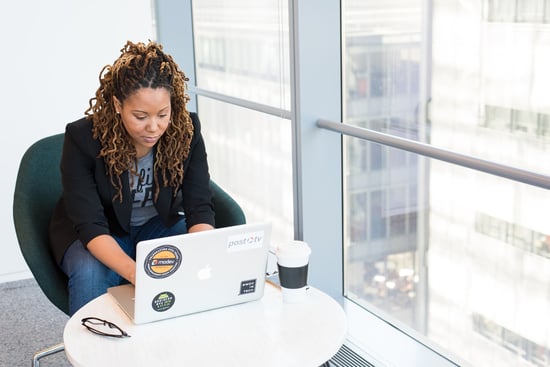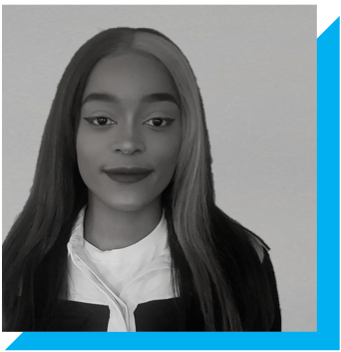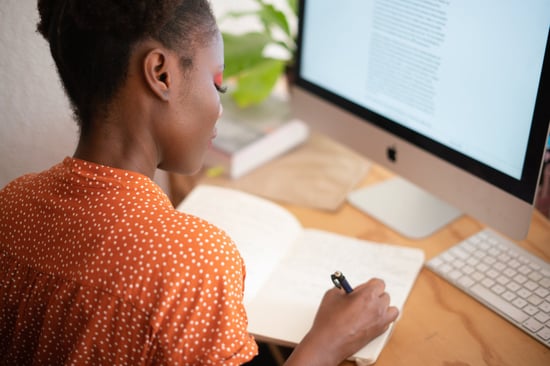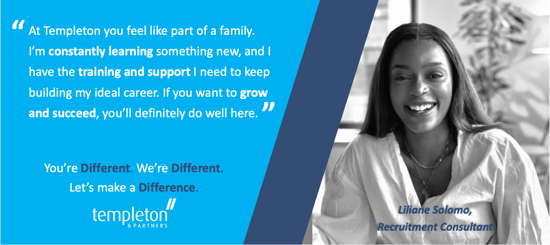As the UK celebrates Black History Month in October, Templeton are raising awareness of the work and achievements of Black pioneers across industries, particularly those in science and technology around the world.

Black people are still underrepresented, under-supported and not sufficiently recognised across all areas of working life:
- Despite 8.6% of graduates with a bachelor’s degree in computer and information science being Black, the world’s largest tech companies are overwhelmingly white, with low percentages of Black IT employees
- Whereas Black people make up 4% of the US working population, Silicon Valley is not sufficiently investing in engaging and training Black talent. Only 3% of tech professionals in the UK are Black
- Only 8.3% of working Black adults are in managerial positions, despite BAME (Black, Asian and Minority Ethnic) tech professionals often having more Academic qualifications than their white colleagues
- The Ethnicity Pay Gap is still wide: African American men earn 87 cents for every dollar earned by a white American colleague, and in the UK, workers of ethnic minority backgrounds earn 6.1% less per hour than white colleagues.
Black History Month aims to address this lack of representation and opportunity by sharing the phenomenal stories and successes of Black people in all areas of work and life. As discussion and sharing experiences are two of the best ways to champion diversity, we spoke to our Tech Recruitment Consultant, Liliane Solomo, about why Black History Month is important and what allies can do to help in the fight for racial equality.

Interview with a Recruiter: Liliane’s Experience as a Black Woman in the UK
Q: Why is Black History Month Important to You?
When I was at school, the history of people like me and other non-white communities clearly wasn’t a priority. We were only taught one area of Black history: slavery.
We’re now able to understand slavery as a starting point for one area of Black history and learn how, since abolition, Black people have established a place in society and made a difference in every one of our lives. We’re thankfully progressing in many areas of UK education – Wales has just committed to making BAME history mandatory in the school curriculum – although there’s still a long way to go in achieving equality.
When I reflect on Black History Month and what many different Black innovators and leaders stood for and achieved, it makes me look at myself. What do I stand for, what do I believe in, and how can I drive this forward? The years of awareness from campaigns like BHM and Black Lives Matter mean I can more easily find positive information about role models and ways to support diverse communities. In the past few years alone, I’ve learned so much about Black leaders that I’d previously never heard of. Black pioneers are increasingly becoming recognised as inventors, scientists, writers, activists and artists in their own right.
The more we celebrate the achievements made by people of colour as the years go on, we’re opening up conversations that we wouldn’t have even thought about before. I’ve found that whereas recently, some people were scared of offending me and people I know, they’re now really interested in our individual experiences and feel more okay about asking questions about ourselves and our lives.
Black History Month means more information is out there: more materials to learn about Black leaders across industries and ways of life, what they did and the causes they represented. For example, Martin Luther King is so much more than his (excellent) I Have a Dream speech – we can find out so much more about his success in civil rights, human rights and campaigns against injustice and economic inequality. BHM is becoming more like a celebration than focusing on all the pain of the past – slavery and suffering are, of course, a significant part of history, but changing the narrative to show empowered, accomplished Black people are so important in progressing towards equality.

Q: Tell Us About Your Personal Experience of Growing Up as a Black Woman in the UK.
Like everyone, my life has had ups and downs. It has been very difficult in the sense that when people talk about Black women, we are constantly seen as our physical features: for example, our figures, the shape of our bodies, our lips etc., which have been fetishized a lot by the media. I always felt that I should have this and that; pressure from inside and outside the community meant women I knew felt we had to compete against each other rather than the culture that oppresses us. Whilst I grew up around women of different shapes, sizes and colours as they were, who were comfortable being who they are, the ‘norms’ placed on you as a woman within a certain culture are hard to go against when you’re young.
Throughout school and from an employment perspective, I’ve been expected to behave in a certain way and often been treated differently – including in very subtle but impactful ways – by my white peers and colleagues. I became used to hearing, ‘Wow, she’s Black and has an education and a career.’ Cultural appropriation, when someone takes your identity and uses it for fashion or for their own profit, is one example of a microaggression that has a huge negative impact, particularly whilst you’re growing up.
As I’ve got older, I’ve seen people become more accepting, which I think is due both to our society becoming more multicultural and campaigns like Black History Month. Now, rather than focusing on my skin colour, people see me as Liliane. I don’t want to feed into stereotypes – I want to fight back in a way that people can see some perceptions are not okay but still keep them engaged enough to continue a discussion and improve understanding.
You start to create a different perception about what it is to be a black woman in work and in a social environment. At Templeton, my colleagues are massively supportive, both in working matters and as friends. I don’t feel people are intrigued by me as they’ve ‘never had a Black friend before’, but I feel that other people are interested in speaking with me and connecting with me because of what I have to offer. Acceptance at work has made my journey a lot better than my previous experiences.
Feeling comfortable in my skin and embracing who I am is part of my experience. Being a young Black woman, it was hard for me to accept who I was. From my hair and my skin, I felt like I had to change to fit in with the narrative about who a Black woman should be and what a Black woman should look like. As I got older, I learned to accept that there are stereotypes and pressure to meet certain standards, and I don’t have to fit in with them. As an adult, I could look at the world and create a different perception by being me: challenging those stereotypes whilst being my authentic self.
Q: What Can Everyone Do to Support Racial Equality?
Most importantly, always start by asking the question. What’s happened for a long time is that many people assume they know Black history and my experiences without any context. For example, many white people see hair as a fashion statement, whereas hair is a really important tribal symbol. Hair can represent whether you’re single, married, or have a daughter; for example – every style of braids signifies an important stage of a woman’s life. This is similar to jewellery, too: people might see a Black person wearing chains and gold jewellery and just think it’s related to fashion. Wearing gold chains symbolises the uplift out of slavery and turns this history into something that can empower people rather than oppress them.
We all have unconscious biases about different groups – even those we belong to! – because of the messaging we get from society, the media, people in power and our own networks. Many of the perceptions we’ve learned unconsciously are very far from accurate. Don’t assume you know someone else’s experience, their opinions, or what their life is like. No matter how afraid you are, it’s always good to ask.
I’ve learned about other cultures around the world by asking questions of many individuals across different backgrounds. The best way to know about someone’s culture, history and upbringing, what their experience is and what their life is like, is to ask genuine open questions to an individual person. Research is an excellent source of new information, but an honest response from an individual is the only way to hear first-hand experiences.
Listening to each other breaks down barriers and changes perspectives. I strongly believe that we need to continue having these conversations – being brave enough to ask and taking the time to share experiences – to further racial equality.

Championing Diversity, Black Leaders and Racial Equality in Tech and Business
Looking to make your tech and leadership teams more diverse? Templeton are a BAME-founded and led recruitment company – find out more about our diverse tech recruitment services.
Discover 10 Black Tech Pioneers in Science and Computing History.




